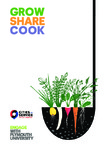Process Evaluation Cities of Service ‘Grow, Share, Cook’ Project Plymouth
| dc.contributor.author | Pettinger, C | |
| dc.contributor.author | Bonney, R | |
| dc.contributor.other | Plymouth City Council | |
| dc.date.accessioned | 2016-11-08T06:40:55Z | |
| dc.date.available | 2016-11-08T06:40:55Z | |
| dc.date.issued | 2016-05 | |
| dc.identifier.uri | http://hdl.handle.net/10026.1/6685 | |
| dc.description.abstract |
With food poverty and hunger current topics of national debate, local recommendations have been made in Plymouth for ‘improved nutrition across the city’ including enhanced access to affordable, healthy food (Fairness Commission, 2014). In response to the above, the Plymouth Cities of Service ‘Grow, Share, Cook’ (GSC) project was set up with the aim of improving the food network required to help tackle food inequalities by encouraging a volunteer network to link the growing (and cooking) of food to the people who need it most. Plymouth University was brought in as an independent consultation partner to support the process evaluation of the GSC project. This report outlines a comprehensive process evaluation which aimed to: i. identify what GSC was delivering; ii. critically assess how GSC was implemented and iii. explore the acceptability of GSC to stakeholders. The objectives for this evaluation were achieved via intervention mapping, stakeholder consultations and observations. In summary, GSC was a pilot complex intervention, made up of three discrete arms – Grow, Share and Cook. It reached 83 volunteers and over 100 disadvantaged families in Plymouth. The ultimate aim of GSC, to increase the number of households that regularly cook and eat (fruit and) vegetables was met: 2336 vegetable bags were delivered in total, creating 80 new distribution locations, one new 12 acre growing plot was leased, sub-divided into 12 x 1 acre plots. Eighty-nine individuals attended two cooking sessions, 80 (90%) of these reporting improved cooking skills as a result of GSC; 77 (87%) reporting eating more healthily than at the start of the project, and 70 (79%) reporting having a healthier diet. The findings indicate that all three stakeholder groups (steering group, volunteers and families) who participated in the process evaluation, agreed on their understanding of the aim of the GSC project and what it intended to deliver. Furthermore, there was overall agreement and many positive comments made about the success of the project, its implementation, and how it might be improved and sustained in the longer term. Given the complex nature of this project, detailed discussion of all of the factors influencing its effectiveness is not possible. We do, however, bring light to some of these, through offering insight into the ‘spirit of the GSC intervention’ (section 4.5) Suggestions are made for how GSC (or elements of it) might be embedded and aligned with strategic city-wide planning/delivery, to maximize its impact and efficiency in the longer term. Recommendations (section 4.0) made include ‘strengthening collaboration’ (section 4.2); ‘improving recruitment strategies’ (section 4.3); ‘building on social aspect’ (section 4.4); ‘participatory approaches (section 4.5) ‘investing in evaluation’ (section 4.6) and ‘optimizing next steps’ (4.7) Through a systematic process evaluation, we have shown that participants in a complex (pilot) food intervention have improved their food behaviours and built stronger social connections. Furthermore, the project elucidated a strong and powerful ‘spirit’, by effectively harnessing energy, vision and skill development to develop and build capacity with local communities which could conclude that stronger community cohesion has begun to be realized, but this now needs to be substantiated and driven forward. This work presents an opportunity - in light of marked changes in public sector services (budget and resources constraints), this food project adds to the compelling case being developed for how more community centred empowerment approaches can be used to engage individuals and improve their (mental and physical) health and wellbeing. We need to think (and act) differently. By creating a ‘social norm’ for food that is positive, one that fosters more creative and connective food activities that can be transformative, food becomes a powerful catalyst to re-connect people, culturally and socially. This provides the potential to enhance health, wellbeing and social justice | |
| dc.format.extent | ? - ? (48) | |
| dc.language.iso | en | |
| dc.relation.ispartof | Process Evaluation Cities of Service ‘Grow, Share, Cook’ Project Plymouth | |
| dc.subject | cooking food | |
| dc.subject | Food poverty | |
| dc.subject | growing food | |
| dc.subject | volunteering | |
| dc.title | Process Evaluation Cities of Service ‘Grow, Share, Cook’ Project Plymouth | |
| dc.type | report | |
| plymouth.author-url | https://www.plymouth.ac.uk/rails/active_storage/blobs/proxy/eyJfcmFpbHMiOnsibWVzc2FnZSI6IkJBaHBBc2xoIiwiZXhwIjpudWxsLCJwdXIiOiJibG9iX2lkIn19--7ab64799f165c1a7e15cfefd2d7e9525b73e0db0/GROW_SHARE_COOK_FINAL_REPORT_CPETTINGER.pdf | |
| plymouth.confidential | false | |
| plymouth.publication-status | Unpublished | |
| plymouth.organisational-group | /Plymouth | |
| plymouth.organisational-group | /Plymouth/Faculty of Health | |
| plymouth.organisational-group | /Plymouth/REF 2021 Researchers by UoA | |
| plymouth.organisational-group | /Plymouth/REF 2021 Researchers by UoA/UoA03 Allied Health Professions, Dentistry, Nursing and Pharmacy | |
| plymouth.organisational-group | /Plymouth/Research Groups | |
| plymouth.organisational-group | /Plymouth/Research Groups/Institute of Health and Community | |
| plymouth.organisational-group | /Plymouth/Users by role | |
| plymouth.organisational-group | /Plymouth/Users by role/Academics | |
| dc.publisher.place | Plymouth | |
| dc.rights.embargoperiod | Not known | |
| rioxxterms.licenseref.uri | http://www.rioxx.net/licenses/all-rights-reserved | |
| rioxxterms.type | Technical Report |


